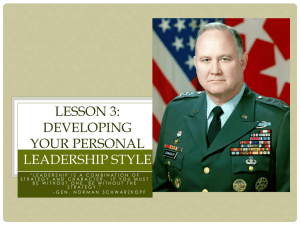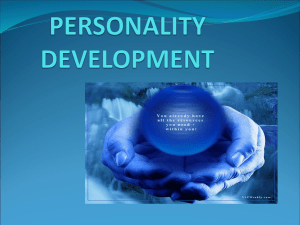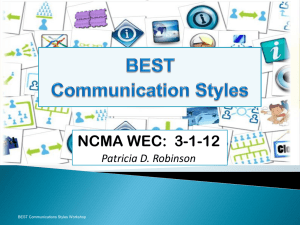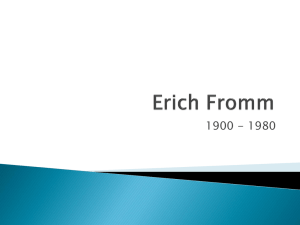Leadership Styles Workshop
advertisement
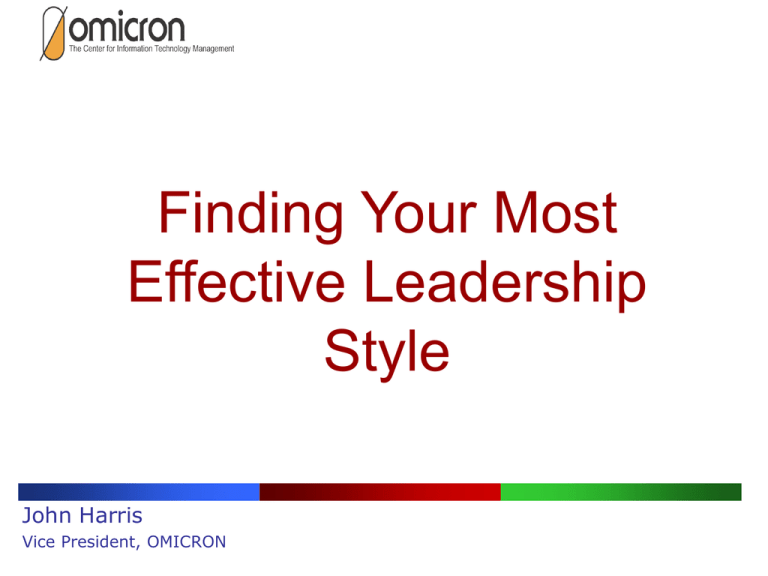
Finding Your Most Effective Leadership Style John Harris Vice President, OMICRON Learning Objectives Learn about successful leadership characteristics, approaches, and styles. Understand your style and how to use it effectively. Agenda What is Leadership and why is it important BEST Leadership Styles Leadership Styles Exercises Leadership lessons from CIO Forum CIOs: Jay Ferro, American Cancer Society Kevin McCarthy, SWM Calvin Rhodes, State CIO Bill VanCuren, NCR Have a clear vision and consistent focus Communicate often Listen – know where your boss is headed Leadership lessons from CIO Forum Find a mentor Leadership is situational Learn from difficult situations Create high expectations Get out of the way Be consistent – true to yourself Be transparent Blend people, process and technology skills What % of your IT career would you say you were well led? 20% never 10% about one-third 65% less than one-fi What is Leadership? What is Leadership? Leadership is a process by which a person influences others to accomplish an objective and directs the organization in a way that makes it more cohesive and coherent. Kenneth Boulding in The Image: Knowledge in Life and Society What is Leadership? Leadership is not something you do to people it is something you do with people Blanchard, Zagarmi and Zagarmi 1994 Understanding Leadership Leadership is the essential ingredient that turns visions and plans into reality Effective leaders harness the energies and gain the commitment of their people towards great achievements What Makes An Effective Leader? The factors that make an effective leader can be classified under three headings: Traits or characteristics they exhibit Behaviors that they show Situations they find themselves in Traits Approach According to this approach leaders are born not made Traits include Intelligence Initiative Self confidence Maturity People skills Organizational capability Behavioral Approach There Task related behaviors are two groups Planning, resourcing and getting things done People related behaviors Gaining support Gaining commitment Motivation Situational Approach The leadership style shown is dependent upon the situation in question due to: The nature of the task The expectations of the followers The characteristics of the followers Authority arises in the situation due to: Knowledge Position Personality What Makes An Effective Leader? Current thinking is that an effective leader possesses key characteristics from the Traits approach Skills and behaviors from the Behavioral Approach Use these in conjunction with appropriate responses from the Situational Approach Why leadership is important to the organization The organization needs to have leadership because leaders provide: Direction Motivation Inspiration These allow ordinary people within the organization to produce extraordinary results over the long term Share some examples of effective leadership from your experiences? • • • • • • • • School Sports Military Business – peers, executives, managers, subordinates Volunteer activities Religious Why were they so effective? How did they impact you? BEST Leadership Style Leadership Style Can be defined as The way in which you carry out your functions as a leader A consistent pattern of behavior A behavior that has been developed by you consciously or sub-consciously over time BEST Personality Types James H. Brewer developed the BEST personality profile based on four personality types: Bold Expressive Sympathetic Technical BEST Leadership Assessment Your personality affects your leadership style Learn the styles, strengths, and challenges for each Be aware of the affects on others Discuss when each style is best used BEST Leadership Assessment The BEST Leadership Style assessment can be taken by purchasing the instrument for $4.95 from http://bestinstruments.net Due to time and resource limitations we will approximate our leadership styles using a key word list. BEST Leadership Approximation Check the words from each column that best fit your behavior style Count the checks in each column and record the number at the bottom of the page The column with the highest number is an approximation of your dominant style BEST Leadership Assessment Column Leadership style 1 Bold 2 Expressive 3 Sympathetic 4 Technical Personality Type Behaviors Bold Expressive Sympathetic Technical First Directness Impressions and Confidence Friendliness Calmness Organization Basic Drive To influence To maintain harmony To be orderly To have power Personality Type Behaviors Leadership Strengths Bold Expressive Sympathetic Technical Making quick decisions Persuading others Loyalty Attention to detail Getting results Leadership Bluntness weaknesses Won’t listen Takes too many risks People oriented Not objective Emotional Accommodating Won’t change Not creative Too Wastes time accommodating talking Accuracy Too ruleoriented Slow to make decisions Personality Type Behaviors Bold Expressive Sympathetic Technical Non-verbal “Go to hell” indicators look with Restless leading Smiling Touching “Soft” look Helping ways Well groomed Neat Leadership Stress problems carrier Not enough Reluctant structure leader Intimidating Leads by emotion Doesn’t always Not always consult or objective delegate No urgency May not be decisive Can forget people Can’t deal with conflict Leadership Styles in the Movies Apollo 13 was the seventh manned mission in the Apollo space program and the third intended to land on the Moon. The craft was launched on April 11, 1970 but the lunar landing was aborted after an oxygen tank exploded two days later, crippling the service module upon which the Command Module depended. Despite great hardship caused by limited power, loss of cabin heat, shortage of potable water, and the critical need to juryrig the carbon dioxide removal system, the crew returned safely to Earth on April 17. The 1995 film was directed by Ron Howard. The film stars Tom Hanks, Kevin Bacon, Bill Paxton, Gary Sinise, Kathleen Quinlan and Ed Harris.Gene Kranz, flight director Leadership Styles in the Movies Failure is not an option - Describe the situation. What is Kranz’s leadership style? What is style of the team? How does Kranz modify his style? Why was this approach so effective for the situation? Square peg in round hole - Describe the situation. What was observed style of lead engineer? Team? Would bold have worked well here? Discussion How do/should leaders modify their basic personality types? With your group, discuss the following situation and how you would respond as the leader. Leadership challenge ABC company recently implemented a new ERP system. There have been many problems and support issues associated with the implementation and the Help Desk has not been effective in addressing the issues. The CIO determined that a big part of the problem was a lack of leadership from the help desk manager. She fired the Help Desk Manager and hired you. The first thing you did when you started was to interview the team. You determined that most didn’t receive consistent and effective leadership from the previous manager or from anyone on the team. Leadership challenge Next you hired a trainer to deliver a leadership development course for the team. Part of the training included a leadership style assessment. Your style is expressive and it has served you well in other jobs. Your new team is made up of 50% technical, 20% bold, 20% expressive and 5% sympathetic. You must now get the team working together to begin to reduce the service outages and issues. Your CIO expects to see improvement in one month. Will you make any adjustments to your leadership style? What leadership techniques will you use to maximize the performance of your team members? BEST Leadership Summary It is important to adapt your behavior to the situation and person. This minimizes conflict and builds stronger relationships. It increases trust, confidence, and productivity. Take Aways What is your observation about leadership? What is your key take away (what will you do differently)?



